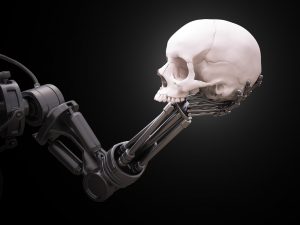 thecreepyfactor.com/wp-content/uploads/2015/11/scifi-horror.jpg%5B/caption%5D
thecreepyfactor.com/wp-content/uploads/2015/11/scifi-horror.jpg%5B/caption%5D
In Isabel Pinedo’s essay on postmodern horror, she asserts that violence in the horror genre “must be situated in the context of monstrosity, culturally defined as an unnatural force” (21). In several of my past and current English courses, we’ve analyzed various literature through the lens of monster literary theory, and I want to add this framework to the discussion started in the previous blog posts. Both Jasmine and Elise’s posts examined robot Ash from Black Mirror in relation to the idea of the postmodern monster (or zombie), discussing how Ash blurs the lines between the human and the nonhuman. Anxiety surrounding technological advances in modern society, especially those pertaining to artificial intelligence, has become a popular theme in science fiction, to the point where it has created somewhat of a subgenre (i.e. robots taking over the world). Stephen Hawking even said that advanced artificial intelligence could potentially bring about the end of human civilization. Could AI be the epitome of the postmodern monster? Why do we fear it so? Much of monster literary theory suggests that monsters are so terrifying to us because we see ourselves in them. This idea ties back to the concept of the uncanny, or the strangely familiar, that we talked about in class the other day. In his essay, “Monster Culture,” Jeffrey Cohen writes that “monsters are our children”(20). He discusses several distinguishing characteristics of what makes a monster, but one of these particularly struck me in light of AI. Cohen explains how monsters are “disturbing hybrids,” dangerous because they are “a form suspended between forms that threatens to smash distinctions”(6). We often ask, what makes a human distinctly a human? Is there such thing as a “soul”? If AI can reason and even experience emotion, traits that have been considered uniquely human throughout the history of mankind, do the lines become blurred? Perhaps one of the most disturbing aspects of AI is that it transcends humanity. It takes away human error. It doesn’t require basic needs like food and sleep. Could it potentially be immortal? On a closing note, as I thought about these questions, I realized that despite his many unsettling components, I found robot Ash from Black Mirror oddly refreshing because he demonstrated the ways in which artificial intelligence falls short of humanity.
Cohen, Jeffrey J. “Monster Culture (Seven Theses).” Monster Theory: Reading Culture. Minneapolis: University of Minnesota Press, 1996. Web.
